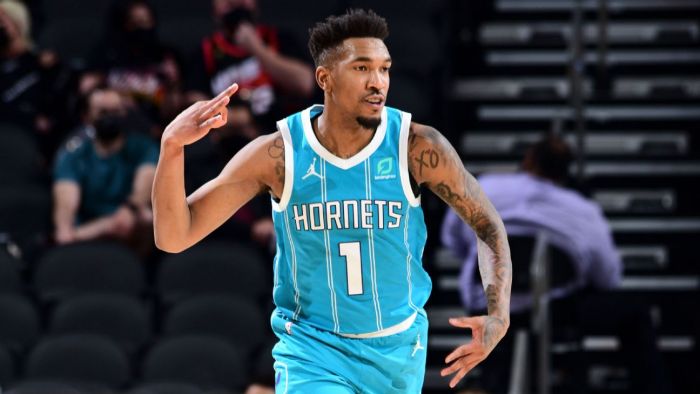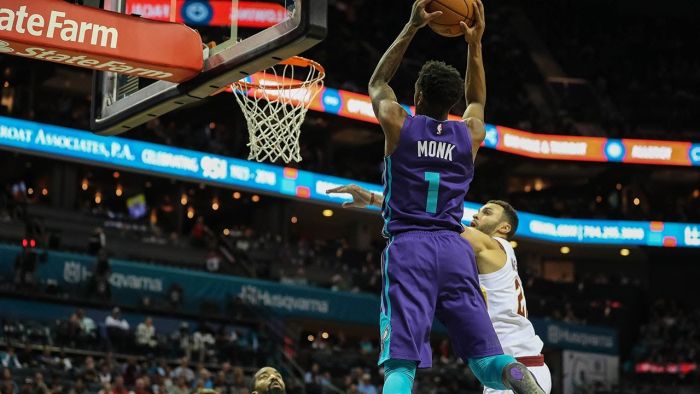In March 2020, the NBA was forced to suspend its season due to the coronavirus epidemic, and Malik Monk was terrified.
Further reading:
How the most blockbuster trade of 2021 saved Caris LeVert's life?
After the NBA suspended its season, Monk found himself having trouble breathing. He immediately thought intuitively whether he had COVID-19, and his mind immediately turned to whether his body would be damaged as a result.
"I was scared of myself," Monk recalled during a video conference a year later. "I was super panicked."
However, in December 2020, Monk was still diagnosed with COVID-19. He lost his sense of taste and smell and was quarantined for 14 days, which also affected his preparations for the season to break out of the cocoon.
Just when Monk recovered and was ready to return to the game, his grandmother passed away due to COVID-19. The death of a loved one not only shocked Monk, but also made him understand the dangers of the epidemic. "This is a disaster," Monk said.
Monk didn't fully recover from the sequelae of pneumonia until the first week of February, but as soon as he returned to the game, his performance showed everyone why he had been looking forward to this season.
After being selected by the Hornets with the 11th overall pick in the first round of the 2017 draft, Monk has been expecting the talent to be realized every year but has never been able to realize it. Finally, he saw the light of day in the 2020-21 season, averaging 12.7 points per game and 41.91 TP3T triples. His three-point shooting percentage hit a career high. Especially when Devonte' Graham and LaMelo Ball were absent due to injuries, Monk was able to jump in and fill the firepower gap, including defeating the Heat with 32 points in a single game and defeating the Suns with 29 points in key battles.


Monk will become a restricted free agent at the end of this season. With his poor shooting in the past and his ridiculous deeds of being suspended for doping last season, the Hornets don't have to consider offering the next contract, but now Hornets general manager Mitch Kupchak and head coach James Borrego may have to worry about this.
For other teams, Monk may have been deprived of opportunities due to his past performance, but the Hornets gave them enough patience and time, and finally waited until his talent blossomed. "He is now more mature and has learned self-management and restraint. Not every young man can To get to this stage," Borrego said, "Every year players come in with talent, but it takes time to irrigate and wait."
For a one-and-done player like Monk, who became a professional player at the age of only 19, the instantaneous transfer of roles and responsibilities caused him to struggle both on and off the court. He used to have a ball in his hands in college, but now he hardly even plays. He played 63 games in the first season and averaged 13.6 minutes per game. "My first year was like a headless fly, and the coach at the time didn't dare to use rookies." Monk said, "Before entering the NBA, I was on the ball everywhere. The team’s ace, he shoots 15-20 goals every game.”
In the 2018 off-season, the Hornets head coach changed from Steve Clifford to Borrego. Although Monk's playing time increased, his offensive efficiency was still very poor. "I was constantly attacked by vicious people on social media, which also made me a little depressed."
After two seasons of stumbling, Monk finally knew how to adjust. He spent more time in the gym and training hall. He also averaged double-digit points and a decent shooting performance last season. However, he was found guilty of violating the ban. Monk was suspended indefinitely due to drug regulations. At the moment, Monk felt that he was almost leaving the NBA, but fortunately the Hornets continued to keep him. Most teams might have given up on training him under similar circumstances.
In a professional league like the NBA with sufficient personnel, there is usually not much patience. It is rare for players to realize their talents after getting the second contract, especially those players with high ceilings. More and more teams will Trade draft picks and young talent for star players.
The Lakers know this best. In the past five years, the Lakers front office has used highly talented players such as D'Angelo Russell, Julius Randle, Lonzo Ball and Brandon Ingram to build a lineup headed by LeBron James and Anthony Davis. In today's trend where superstars show off their talents, young players face pressure to fulfill their talents when they step on the NBA stage. For example, although the Nuggets gave Michael Porter Jr. a lot of patience, they did not treat this season's rookie RJ Hampton in the same way. Before the trade deadline, the Nuggets also considered whether to use it as a bargaining chip.
"Player development" has always been the most unpredictable topic in the NBA. Each team has its own set of policies and player development schedules. For example, the Thunder give young players a lot of time to make mistakes during the rebuilding process, while the Warriors want to continue their power. James Wiseman, the second overall pick, is a bit unsure about how to develop.
For teams, the most difficult thing about player development is that there is no universal formula. "Most teams just leave it to the Development League to feed time." A scout said, pointing out that some rookies cannot get enough playing space. "And teams that are really good at developing players will integrate the Development League more fully and provide sufficient resources."
However, no matter which development model it is, the most important thing is whether the players are willing to pay. Monk didn't find a catalyst for growth until the third season. He removed the social media app, became more active in training, took the initiative to discuss with coaches, and increased the amount of training. In the 2019 off-season, Monk added 20 pounds of muscle to increase confrontation. He also fine-tuned his shot mechanism and optimized his shot selection through video analysis. In addition to the physical aspects, Monk has also become more mature mentally. "Compared to the previous season, he has become more willing to listen." Charlotte's veteran Bismack Biyombo said, "For me, this is The most satisfying part is that it also makes the communication between him and his teammates smoother."
Coach Borrego understands Monk’s changes and progress best. “In the first two seasons of his career, he ran into obstacles everywhere. I often talked to him in detail after he came here.” Borrego said, “Now he shows professionalism and regularly appears in the training room and in videos. After the analysis meeting, these results were realized in the frontcourt and we found the rhythm on offense and defense."
The growth of players also leads to the improvement of coaches. Borrego believes that Monk makes him more patient in player development and willing to give young players more room for error. Borrego now gives Monk 20-25 minutes on a regular basis, giving him the task of coming off the bench to grab points and changing the rhythm of the field if he falls behind. This gives Monk more confidence.


Now Monk has regained the scoring explosiveness of 104 three-pointers in a single season in college (third in team history). Especially his outside firepower has finally come to fruition, and he has a three-point shooting rate of more than 40%. "He has excellent physical fitness, He has strong athletic ability, and now he has finally emerged from the outside, becoming the type of player we look forward to and the most popular player in the league."
Now Monk is back in the Hornets' future blueprint, and Monk's growth will also test the Hornets front office. He is not the cornerstone of the team, but he may be a useful role player, so he must be exchanged for a new player. For a good star player, it is better to keep him as a long-term green leaf in the future. This is something for the coach and general manager to worry about.
There are fewer and fewer cases of teams like Monk investing patience and resources to successfully develop. Especially in big cities, they tend to choose the trading method of exchanging talents for ready-made stars, such as the Nets and Lakers, while small cities such as the Hornets want to compete. , in addition to hoping to select Zion Williamson who will become a top player as soon as he enters the league, he must be more patient to invest in the long term and look for small blue chip stocks like Monk that take time to brew.